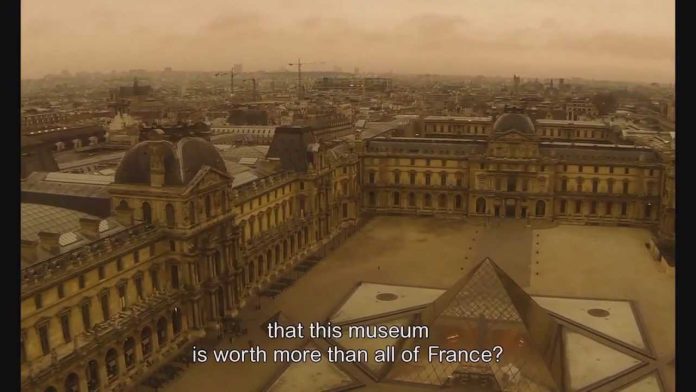RUSSIAN director Alexander Sokurov delves into the history of the Louvre in Francofonia, an appealing docudrama that no doubt will win over historians and fans of the so-called heir to Tarkovsky.
Using a mix of archive footage and reconstruction of life inside the said museum under Nazi rule, Sokurov depicts a museum where people are trying to ensure that various artwork remains hidden from the Nazis.
Using examples such as Egyptian mummies, self-portraits and of course, the Mona Lisa, we are given a glimpse into the life of the museum’s most famous features and the people that were around at a defining point in France’s history.
The main storyline focuses on the two central characters, Jacques Jaujard (Louis-Do de Lencqueasing) who was the then-Director of French National Museums, assigned to protect the artworks. The other is a German curator Franz Wolff-Metternich (Benjamin Utzerath) who is assigned to leadership of the museum, but in time, finds himself siding with Jaujard to defy Hitler and protect them.
This film leads us from the very start into Sokurov’s comforting yet patience-requiring direction, starting with a narration of the actual Sokurov conversing with a seaman friend about finishing the film, likely this. Often we see interspersed scenes showing the director attempting to engage in conversation with his friend whose bad signal over the laptop not to mention weather makes that nee on impossible.
It is safe to say that only fans of the majority of Sokurov’s previous works will go in knowing what to expect, whilst more conventional viewers may find the subject matter tricky to deal with.
Imagine George Clooney’s forgettable The Monuments Men, dealing with the similar theme of artworks being protected during World War Two but the flip side. Action is replaced with documentary-style footage and characters wandering through the Louvre, and with Sokurov we get an anti-Hollywood retelling of the events this film depicts, not to mention a far better examination.
We see early on the moments Hitler and his soldiers entered Paris, keen on searching for the Louvre after expressing satisfaction where the ”tower” is situated. Sokurov then follows with an aerial shot of the city as well as a tracking shot including the museum depicted in a hazy golden-brown landscape where he rhetorically asks what we would be without museums, including Russia’s Heritage.
Compare the shot with Hitler in the city and contrast that with a tracking shot depicting modern-day Paris, as ordinary streets are featured. Sokurov narrates as he expresses whether galleries, libraries and universities, amongst other aspects of culture, are worth risking for the sake of war, his anti-war message clear as the modern day shows how close France came to possibly losing those privileges.
He balances this meditation on culture with the documentary aspects that one cannot help but be drawn into this method of examining such an iconic area. He also makes such a respectable job of focusing on images of some of the paintings depicted that it feels like a guided tour from the comfort of our screens.
There are moments of brief but memorable shots that one cannot forget, such as the close-up of a German general’s contact details, and a young lady being pursued by a would-be suitor on a bridge seen from the perspective of a figure from a balcony.
He also crafts a surreal sequence in which the iconic French figures figures of Napoleon and Marianne are seen in the Louvre examining the Mona Lisa. As they view, she proceeds to repeat the term ‘Eternity, freedom, brotherhood’, with his quiet reply of ‘It’s me” being followed by ”Without me, there would be nothing”.
Much as we like the scenes depicting the conversations between French and Germans or Sokurov’s ‘cameo’, when we see scenes like this, we enjoy much more the showings of figures inside the Louvre, demonstrating the vitality of the area.
It is not the first Sokurov film one would recommend seeing as one has to get his style and with some, that could take up to three different viewings to get somewhere. Faust or Mother and Son would be a better film to start off exploring Sokurov and if one can fall in love with those, this is a must-see.
Francofonia is more of a meditation than convention and that is what makes Sokurov the trusting director he is, allowing a unique take on storytelling that arthouse audiences will more than appreciate.




























